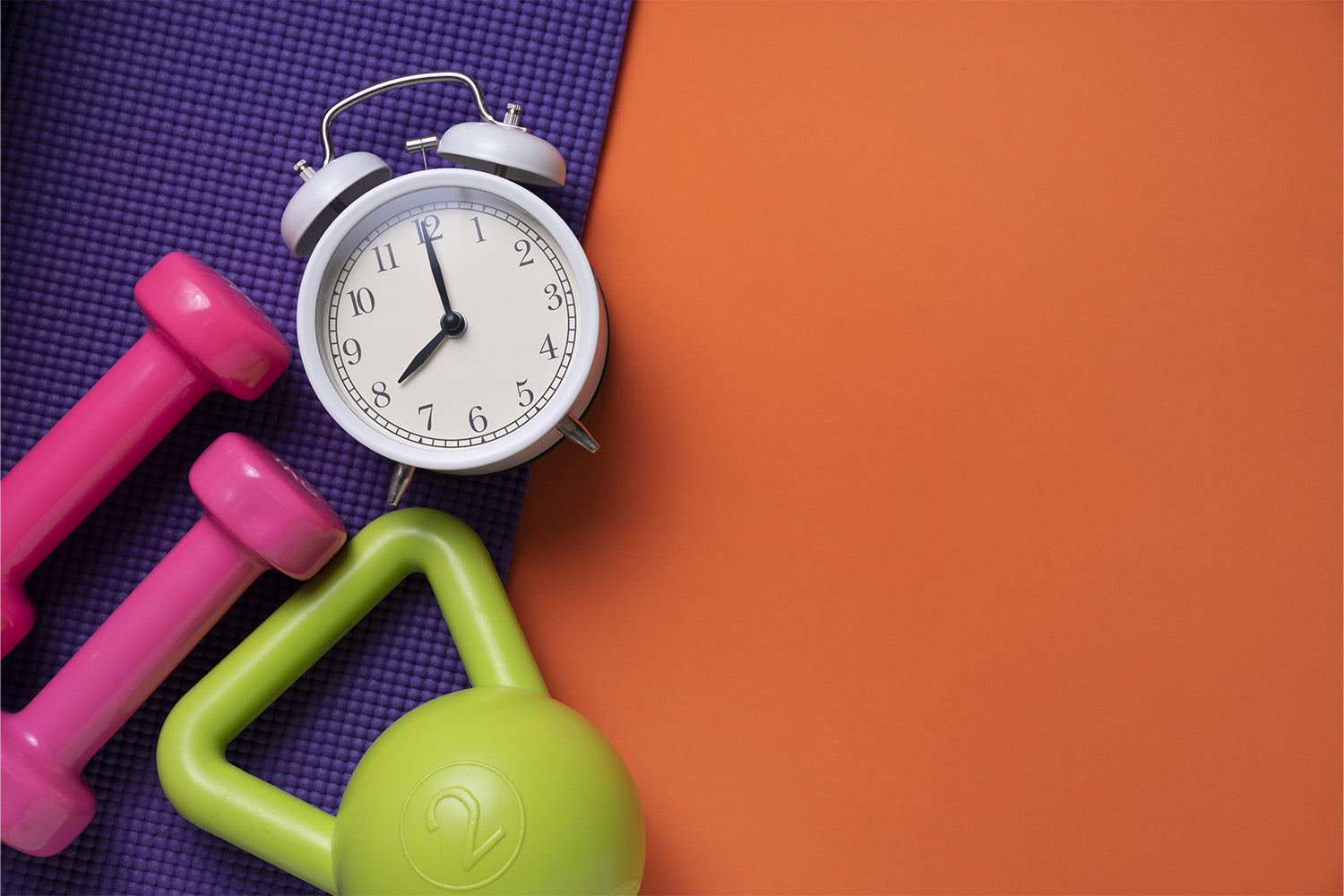The hardest part of working out is finding time to do it. You’re a busy person, and you may have only one or two windows in your day in which you can squeeze in a workout. Perhaps you can only work out in the morning or really late at night. This may have you wondering: When is the best time to workout?
Regular exercise is absolutely crucial to your health, so any exercise at all is a good thing, no matter the time of the day. Whether early, late, or anything in between, take any opportunity you can get to exercise.
Some people stick to their typical routines, while others have varied workout plans. Although consistency is key, having a gym routine can be a good habit to have. There is no right answer for the best time of day to workout; some people prefer morning exercise, late afternoon exercise, while others prefer evening workouts.
That being said, if you can schedule your day around your workout, some times of day might be better for you than others. Ultimately, it all depends on you, and EnergyFit is here to help. Find out how the time of day can affect your workout:
Working Out In The Morning
For many people, the morning is the most convenient, or only, the time they can workout. If you work a nine to five or have kids you need to take to and from school; this may be the best time for you to work out as well. As they all say, the early bird catches the worm!
If you are used to waking up early, early mornings could be the best time for you to get a workout in before taking on the day. Be sure to set an alarm if you want to hold yourself accountable to wake up for a workout at the crack of dawn.
From a cognitive standpoint, there’s a clear benefit to working out first thing in the morning. A morning workout allows you to start your day off with a boost of endorphins and a feeling of accomplishment. Think about it; you’ll have accomplished something before most people have even woken up. That’ll give you some confidence as you attack the rest of the day.
Furthermore, getting your workout dealt with in the morning means you’ll have one less thing to worry about the rest of the day. This can allow you to focus on your work and allot more time for friends and family.
On top of that, studies have shown that working out in the morning can boost your metabolism throughout the rest of the day. This means that you’ll burn more calories as you eat them. Conversely, if you work out at night, your metabolism will be at its highest while you’re sleeping.
Moreover, working out at night can potentially compromise your sleep. This is because sleeping and working out have two opposite objectives. While one increases your heart rate, the other tries to lower it. As a result, going to bed with an increased heart can make it harder to fall asleep.
A Note on Working Out on an Empty Stomach
When it comes to working out in the morning, the question is often asked: Should I eat breakfast before or after? There are multiple schools of thought at play here. First, it is generally advisable to eat something before a workout. This gives you the energy you need to workout and the macronutrients you need to recover and produce results.
That being said, some studies have shown that working out on an empty stomach can burn up to 20 percent more body fat. Therefore, it may be beneficial to hold off on breakfast until after.
Above all else, listen to your body as everyone is built differently. While some can workout safely and efficiently on an empty stomach, others may not be able to. If you’re not sure, have a bowl of oatmeal before you workout. This carb-rich snack will give you plenty of energy to complete your workout without weighing you down. Save the big, protein-rich breakfast for after your workout.
Working Out In the Afternoon or Night
Morning workouts clearly have their benefits, but what about getting your sweat on in the PM? Depending on your job or classes, this may be the most convenient time for you to workout, and it definitely has its advantages!
If you're looking for better sleep at bedtime, evening exercise may help kickstart your nighttime routine. Not only does working out improve your mood, but it can also help decrease cortisol levels.
The Case For The Afternoon
Some studies have shown that your body’s ability to perform peaks in the afternoon. As your body temperature increases throughout the day, your muscles function, enzyme activity, and endurance are all optimized. Therefore, you may be able to get the highest quality workouts between two and six in the afternoon.
In the afternoon, your reaction time is at its quickest, making it an optimal time for high-intensity interval training (HIIT), such as on the Ski-Row Air and Ski-Row Air + PWR machines by EnergyFit. HIIT training in the afternoon is further improved by lower heart rates and blood pressure, which increases your performance potential.
The Case For Night
One potential advantage for working out at night is faster oxygen uptake kinetics. This means you use your resources more efficiently than in the morning. Furthermore, you may also need less warm-up time at night, making the nighttime better for quicker workouts.
On top of that, while studies have shown nighttime workouts to have a negative effect on sleep, other studies have shown them to have a positive effect. In fact, HIIT training at night can help you fall asleep faster, reduce nighttime awakenings, and increase the time spent in slow-wave sleep. This means EnergyFit’s machines are perfect for any time of day!
How EnergyFit Saves You Time
For many people, finding an hour or more to work out is an impossibility. If you have a busy schedule, it can be extremely difficult to fit in a high-quality workout. EnergyFit has solved that problem.
The Ski-Row Air and Ski-Row Air + PWR machines by EnergyFit combine high-intensity interval training (HIIT) with resistance training, providing you with an all-in-one workout that targets over 80 percent of your body’s muscles. In just 30 minutes, you can achieve a high-quality, full-body workout that’ll have you sweating bullets. Even if you only have 15 minutes to spare, you can achieve an unparalleled workout on one of EnergyFit’s machines.
With EnergyFit, you don’t have to sacrifice one for the other. You can have it all with one of the best full-body workouts on the market.
So Is There a “Best” Time To Workout?
In summary, there is no “best” time to workout. The best time to workout is whenever you have time to do it. Regular exercise is crucial to your health, and your body will benefit from it no matter what time of day it’s done. Depending on your personal preferences, there could be drawbacks if you are not used to working out at a certain time a day other than what you're used to.
Regardless of when you get some physical activity into your day, there will be health benefits, whether it be weight loss or muscle growth. When it comes to exercise habits, having a workout schedule can lead to better results because of consistency being involved.
That being said, working out in the morning has some clear benefits. Not only can it give you a boost of endorphins and improve your mental state, but it can also speed up your metabolism, allowing you to burn more calories throughout the day.
Working out at night can also be beneficial, though. While some studies say that late workouts can have a negative impact on your sleep, others say they can actually have a positive impact. Ultimately, it comes down to your body, preferences, and needs.
Sources
Neural response to pictures of food after exercise in normal-weight and obese women | NCBI
Different effects of heat exposure upon exercise performance in the morning and afternoon | NCBI




Leave a comment
All comments are moderated before being published.
This site is protected by hCaptcha and the hCaptcha Privacy Policy and Terms of Service apply.